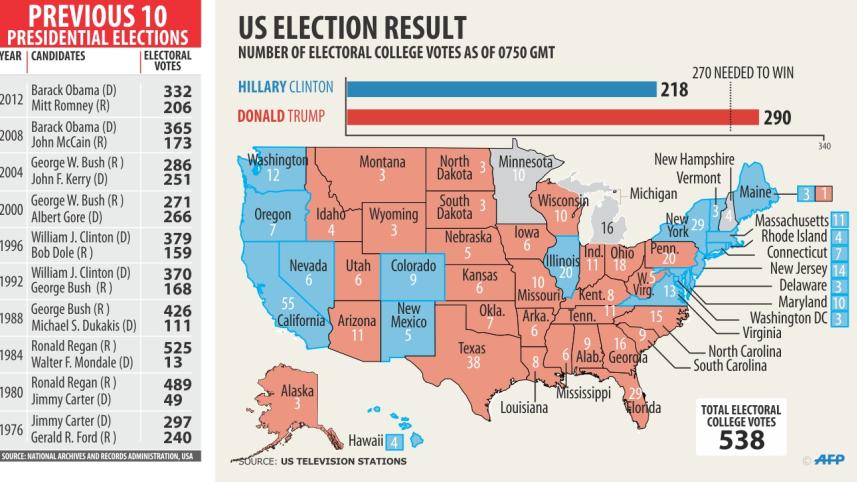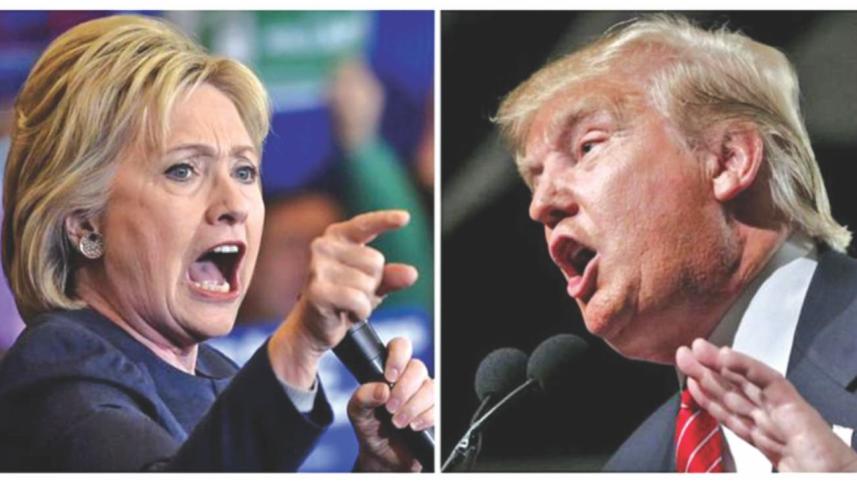Analysis: Can Clinton still win the presidency?

Millions of Americans are now wondering can Hillary Clinton still win the presidency.
They are searching for any legal way to reverse the results of the election in which Donald Trump won.
Anti-Donald Trump protest organizers found ways how to keep Trump out of the White House.
Also READ: Clinton could not break the 200-year-old curse
The only way is: a stunning surprise on December 19 and if more than two dozens presidential electors on that day do not cast their votes to formally elect Trump as the next president and vote for Clinton.
In a petition, they are urging presidential electors not to vote Trump on December 19 and elect Clinton instead.

READ more: Analysis: Voted for Trump, but now they think of impeachment
Around five million people have signed the online petition which energised agitators who continued demonstration in major US cities for the fifth day in a row since the outcome of the Tuesday's election.
Is it possible for presidential electors belonging to Donald Trump camp to vote against him on December 19? How many more votes Clinton needs to win the presidency?
As it stands now, Trump has 290 electoral votes, or 20 more than the 270 needed to secure the presidency. Clinton, meanwhile, has just 228 electoral votes.
Twenty electoral votes have yet to be counted. If Clinton were to win those 20 votes, she would still need 22 electors to defect from Trump for her to win the election.
According to the USA constitutional provision, in every state except Maine and Nebraska, the candidate who wins the most popular votes in the state receives all of the state's electoral votes.
The number of electors in each state is the sum of its US senators and its US representatives. In addition, the District of Columbia has three electoral votes. A candidate must receive a majority of 538 electoral votes to be elected president. The magic number is 270.

In those 15 states, electors are free to cast their vote to anyone- Trump or Clinton. So, any of them can revolt against Trump.
In the 24 other states where such rebellion is not permitted and electors are rule-bound, they can get away with cross-voting by paying a small fine.
International Business Times (IBT) in a report said getting enough electors to swing their votes from Trump to Clinton, however, is easier said than done.
"As the Change.org petition states, electors who vote against their party in a number of states are forced to pay a fine. There is also the matter of convincing enough electors to vote for Clinton," said IBT.
Petition organizers on their site said for electorates in states that by law require them to ballot for the nominee who won the most votes, "their vote would still be counted, they would simply pay a small fine. "We can be sure Clinton supporters will be glad to pay!"
Such a revolt is unlikely to happen on a large scale, but the mood to defy the electoral verdict is particularly strong in cities across America that voted overwhelmingly for Hillary Clinton, underscoring a growing urban/suburban-rural/hinterland divide, writes Chidanand Rajghatta for Times of India from Washington.
In the American democracy an elector if he does not vote his party-line is called faithless elector.
FairVote, a non-partisan platform works for electoral reforms has come up with good news for petition organizers by releasing a list of faithless electors.
Since the founding of the Electoral College system 215 years ago, there have been 157 faithless electors. And of them 82 electoral votes were changed on the personal initiative of the electors.
Three of the votes were not cast at all as three electors chose to abstain from casting their electoral vote for any candidate and 71 votes were changed because the original candidate died before the day on which the Electoral College cast its votes.
Sometimes electors change their votes in large groups, such as when 23 Virginia electors acted together in 1836. Many times, however, these electors stood alone in their decisions.
Heavy.com, a news and information website based in New York City, however, said the chances that actually turns the election in Clinton's favor, and functions as more than a symbolic gesture, remain remote.
History and public policy professor Alex Keyssar of Harvard University thinks it is unlikely that Republican electors will go rogue on their party. Electors, who either had Democratic convictions or questions about Trump, could be swayed by the fact that Clinton won the popular vote.
It would not shock him if one or two electors did defect but it would surprise him if 25 did that.
The electors will not cast their ballots until December 19, so anything could happen, says Heavy.com, but probably won't.




 For all latest news, follow The Daily Star's Google News channel.
For all latest news, follow The Daily Star's Google News channel.
Comments